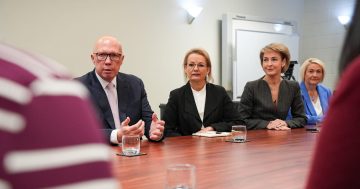Emma Walsh* says we’ve come a long way on supporting people experiencing domestic violence, but there’s more employers can do to help.
 We know that employers play a key role in supporting those experiencing domestic and family violence.
We know that employers play a key role in supporting those experiencing domestic and family violence.
But with the shift in working from home, the access to a physical “safe space” in a workplace that survivors were accessing prior to the pandemic has significantly reduced.
During periods of lockdown, when Australians were required to stay home, we heard the impact of this on survivors and the uptick in calls to support services, often from those who found themselves in their homes all day with their abusers.
These survivors may have still been connected to work virtually, but they lost the physical access to a “safe space” by not being able to go to work.
With remote working likely to become increasingly normalised across many workplaces, we now need to consider the ramifications and the opportunity workplaces have to support those experiencing domestic and family violence.
It takes, on average, a staggering seven attempts for survivors to leave an abusive relationship, according to research.
The cost comes in at an average $18,000, along with an average 141 hours to make it happen.
Meanwhile, 62 per cent of women who have or are currently experiencing domestic and family violence are in the paid workforce.
An average 13 women are hospitalised due to assault injuries from domestic violence every day.
Domestic violence is estimated to cost businesses $2 billion annually, according to research released by the Champions of Change Coalition in November 2021.
Domestic violence is a workplace health and safety issue.
It’s clear that employers can provide significant, and in some cases life changing support to those experiencing violence, to make it easier to leave.
Thankfully, many employers are already well ahead of the issue, and are open to sharing their stories and examples of what they’ve found is helping.
That support starts with offering paid domestic violence leave, but it goes further to other initiatives, such as offering free counselling, “first responder” training, cash advances, and initiatives that can prevent perpetrators from accessing work resources like phones and laptops for carrying out their abuse.
Paid domestic violence leave has come along way
The Workplace Gender Equality Agency has increasingly seen a sharp rise in employers adopting formal strategies to support those experience domestic and family violence.
The number of employers that adopted such a policy or strategy jumped from 13.3 per cent to 60.2 per cent over the six years until 2019.
Meanwhile, the number of employers offering paid domestic violence leave has increased sharply over the past five years, and this year we’ve seen this issue progress significantly with the Fair Work Commission handing down its landmark decision in May granting millions of Australians access to 10 days’ paid domestic violence leave if needed.
Last month, this entitlement was extended beyond permanent employees to casual workers, under new legislation presented within the first weeks of the new Albanese Government.
We can’t understate the importance of this leave.
It ensures survivors are financially supported while accessing medical or specialist appointments, while dealing with legal matters and court hearings, or while moving to a new home.
Back in May, the Fair Work Commission bench declared that such leave was “an emerging industrial standard in bargaining”.
It noted that it is a critical mechanism enabling employees to maintain employment and financial security when dealing with family and domestic violence.
The Minister for Employment and Workplace Relations Tony Burke said on extending the leave provisions to casual workers that “this has to be a universal entitlement”.
Other initiatives
Some progressive employers have now been offering paid domestic violence leave for years.
They have since taken additional steps to support team members experiencing domestic violence.
The 2021 Champions of Change Coalition report highlights a number of key initiatives workplaces can pursue, and shares case studies of what workplaces are already doing, including from some of our Family Friendly Workplace certified employers.
The Coalition urges employers to start the process with elevating and demonstrating a commitment to gender equality and a respectful workplace.
From there, they note the power of engaging the domestic and family violence sector, as well as team members with lived experience, to help deepen the organisation’s understanding of the issue and the power of a workplace response.
The Coalition particularly notes the opportunity to implement a leading domestic and family violence policy that has clear definitions, and provides expansive support mechanisms like paid leave, flexible work, relocation help and financial assistance.
Also beneficial is ensuring a group of team members are trained as responders, so they have the language and the tools to support in providing an appropriate workplace response.
QBE launched a Family Domestic Violence First Responders Network in 2019, partnering with UNSW Gendered Violence Research Network to deliver two days of training for their program, along with regular connecting and refreshers for their network.
Other employers like EY also have a comprehensive first responder program.
It wasn’t so long ago that the thought of linking domestic and family violence to the workplace was unmentionable.
We didn’t have the language, or the understanding of the role workplaces can have.
Much has changed, for the better.
We have the language.
We have the resources and greater knowledge on understanding what can help.
And we are considerably more comfortable in raising the issue.
We have, across many workplaces, ended the silence.
But there’s more to be done.
Employers have incredible power to help in ending domestic and family violence, and the opportunity to bring team members together around this essential goal.
*Emma Walsh is the CEO of Parents At Work, a global education and policy advisor business that campaigns for parental leave equality to create more family friendly workplaces.
This article first appeared at womensagenda.com.au.











